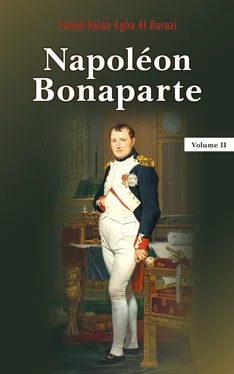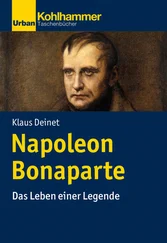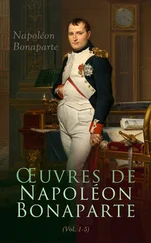Fahed Aslan Agha Al Barazi - Napoléon Bonaparte
Здесь есть возможность читать онлайн «Fahed Aslan Agha Al Barazi - Napoléon Bonaparte» — ознакомительный отрывок электронной книги совершенно бесплатно, а после прочтения отрывка купить полную версию. В некоторых случаях можно слушать аудио, скачать через торрент в формате fb2 и присутствует краткое содержание. Жанр: unrecognised, на английском языке. Описание произведения, (предисловие) а так же отзывы посетителей доступны на портале библиотеки ЛибКат.
- Название:Napoléon Bonaparte
- Автор:
- Жанр:
- Год:неизвестен
- ISBN:нет данных
- Рейтинг книги:4 / 5. Голосов: 1
-
Избранное:Добавить в избранное
- Отзывы:
-
Ваша оценка:
- 80
- 1
- 2
- 3
- 4
- 5
Napoléon Bonaparte: краткое содержание, описание и аннотация
Предлагаем к чтению аннотацию, описание, краткое содержание или предисловие (зависит от того, что написал сам автор книги «Napoléon Bonaparte»). Если вы не нашли необходимую информацию о книге — напишите в комментариях, мы постараемся отыскать её.
Napoléon Bonaparte — читать онлайн ознакомительный отрывок
Ниже представлен текст книги, разбитый по страницам. Система сохранения места последней прочитанной страницы, позволяет с удобством читать онлайн бесплатно книгу «Napoléon Bonaparte», без необходимости каждый раз заново искать на чём Вы остановились. Поставьте закладку, и сможете в любой момент перейти на страницу, на которой закончили чтение.
Интервал:
Закладка:
On receiving this disquieting news, Napoléon was irate, and recalled Massena to France.
As for Wellington, the commander in the chief of the allies (British, Spaniards and Portuguese), he was far from popular. The glamour of his early victories had waned; he was blamed for the rashness of his summer campaign, the loss of his wounded and the hardships of his retreat from Talavera. Opposition pamphleteers had assailed his family as ‘rapacious Irish Tories greedy in every public life’; his elder brother, Lord Wellesley, was almost the most hated man in England with his intolerable viceregal airs. He was also attacked for his notorious debts and his “common whore”, Sally Douglas, who he is rumoured to have taken with him on his mission to Spain. His brother Arthur Wellesley (Duke of Wellington) elevation to the Peerage after Talavera as Viscount Wellington was regarded as a Tory promotion. Even his army in 1809 regarded him as a rash Irishman, who gambled away the lives of his men at Talavera and callously allowed them to rot in the Guadiana marshes ‘to please his Spanish allies’. A surgeon at the military hospital at Lisbon told Charles Napier that Lord Wellington deserved to be hanged for his reckless waste of life.
But after Torres Vedras, which was considered the turning point of the campaign, the diatribe had abated.
To the good fortune of Wellington, Napoléon did not take the field in Spain after his precipitated return to France to deal with the new Austrian threat; for his Marshals, as competent as some were, had neither the vision nor the military genius of the Emperor. They performed outstandingly as long as the Emperor led them into battle.
Since 1796 Napoléon had three times taken the field against Austria and three times defeated her. Now, he was preoccupied with the Russian menace. Russia, under Catherine the Great, Prussia, under Frederick the Great, and Austria had formed an alliance in 1772 and dismembered the kingdom of Poland; by 1795 Poland disappeared from the map. During the French revolution, which had guillotined their royal cousins or sequestered their property, the ruling houses of Russia, Prussia, Austria and England were in open war with France.
Alexander, the grandson of Catherine the Great, who ascended the throne after the assassination of his father Tzar Paul in 1801, was given his name and tutored by his grandmother in hopes that one day he would emulate his namesake, Alexander the Great. The dream of establishing a Great Panslavic state under Russia was endangered by his Foreign Minister Czartoryki, a Polish Prince by birth. Therefore, the roots of the unstable alliance between Napoléon and Alexander were always subject to the undercurrent of anti-Napoléon policy as well as the animosity from the Royal Princes and the Tzarina Mother. Yet, in the beginning, the two emperors had struck up a genuine sort of friendship, which eroded with time, mainly due to Tzar Alexander’s vacillating character and Napoléon’s persistent demands on Alexander to live up to the terms of their alliance, including the strict Continental System.
Napoléon, who detested homosexuality as most Frenchmen did and still do, found Alexander effeminately beautiful, prompting him to say “had he been a woman, I would have made her my mistress”; at the Ecole Militaire, he had alienated himself from Laugier de Bellecour for such rumours about his friend. However, when making decisions on public office, he chose whom he considered most fit without distinction or prejudice. He appointed Cambacérès, a known homosexual, as second consul, and he proved to be a loyal servant through the years of the Empire, rising to the high rank of Arch Chancellor. When Napoléon returned from Alba, Cambacérès rallied to the service of his emperor.
CHAPTER 29
THE DRUMS OF WAR
Relations between Tzar Alexander and Napoléon in 1810 were becoming more exacerbated with every passing day. Napoléon enlarged the Duchy of Warsaw by annexing the Galician provinces ceded from Austria in October 1809; the Tzar, already apprehensive about the creation of the Duchy of Warsaw, had demanded a guarantee from Napoléon that an independent kingdom of Poland would not be revived. An agreement signed to this effect by French ambassador Caulaincourt in January 1810 was rescinded by Napoléon. The subsequent modifications that the French Emperor proposed were rejected by the Tzar. To exacerbate matters further between the two emperors, Prince Poniatowski, Napoléon’s ardent Polish ally, warned the Emperor that Tzar Alexander was planning a surprise attack against the French garrisons beyond the Elbe, encouraged by their reverses in Spain. Napoléon’s secret agents had further informed him that Alexander had discussed with his Polish ally Prince Adam Czartoryski the rallying of the Poles to the Russian side. “Only if Russia guarantees an autonomous and free Poland, would they then consider defecting to the Tzar’s side,” answered Czartoryski, a thought not cherished by Alexander.
Another setback to the Russian Tzar was Sweden’s Riksdag’s approval of Bernadotte’s nomination to the Swedish throne, advocated by the pro-French Party as heir to Charles XIII.
In December 1810, Tzar Alexander, exhorted by his anglophile advisers, imposed high tariffs on French imports and, flouting the Continental System, he opened Russian Ports to neutral shipping; a portent for Napoléon that his vacillating ally of yore was now bent on re-joining the emperor’s enemy, England.
At St. Cloud, after his return from his honeymoon in Holland, Napoléon had issued four decrees in July, August and October 1810, tightening the noose further on the Continental System. Heavy import duties were imposed on all colonial produce, including coffee, tea, sugar, cocoa and tobacco. Any such products discovered in Europe were to be sequestered and destroyed. As a result, smugglers of contraband products throve, but when caught were severely punished. The Continental System and its disastrous aftermath rebounded not only on England but the whole European Continent. Even the governing body of the Council of State was complaining. and Napoléon’s speech in April 1810, meant to alleviate their foreboding, was met with deaf ears.
Calumnies, machinations and the language of war were rife amongst the Russians. The two salient abettors, each for his own reasons, were Alexander and Napoléon. To the Comte de Narbonne, the Minister of War in 1792 who had now rallied to the empire, Napoléon confided in early 1812: “Alexander the Great was as far from Moscow as when he marched to the Ganges. I have always said this to myself, ever since the siege of Acre.”
Napoléon’s allusion did not pass unnoticed. Narbonne, a Grand Seigneur of the old nobility, later commented on this conversation. “What ideas! What dreams! What a man! Where is the keeper of this genius? It was half-way between Bedlam and Pantheon.”
With Napoléon’s annexation in Dec. 1810 of the Duchy of Oldenburg, Lubeck, Bremen and Hamburg, Tzar Alexander retaliated in Dec. 1810 against the French by slapping high import duties on all French goods and re-opening Russian Ports to English trade. Napoléon considered the Tzar’s actions tentamount to a covert declaration of war.
On June 1811, the French ambassador to Russia, Caulaincourt, was recalled to Paris. He warned Napoléon of the difficulties of the Russian terrains and the endless steppe, that the Russian plan was to lure him into their hinterland and exhaust his forces; logistics under such extended lines of communications would become exceedingly difficult if not impossible. Charles XIII of Sweden had suffered a tragic end, courageous as he was; his temerity had brought him a disasterous end.
“Bah! A battle will shatter the feeble Alexander and his fortifications of sand.”
Читать дальшеИнтервал:
Закладка:
Похожие книги на «Napoléon Bonaparte»
Представляем Вашему вниманию похожие книги на «Napoléon Bonaparte» списком для выбора. Мы отобрали схожую по названию и смыслу литературу в надежде предоставить читателям больше вариантов отыскать новые, интересные, ещё непрочитанные произведения.
Обсуждение, отзывы о книге «Napoléon Bonaparte» и просто собственные мнения читателей. Оставьте ваши комментарии, напишите, что Вы думаете о произведении, его смысле или главных героях. Укажите что конкретно понравилось, а что нет, и почему Вы так считаете.












